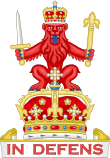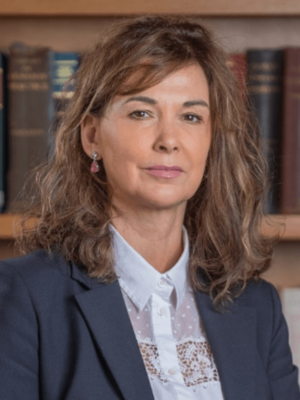Lord Advocate facts for kids
Quick facts for kids His Majesty's Lord Advocate |
|
|---|---|
 |
|
| Crown Office and Procurator Fiscal Service | |
| Appointer | Monarch on the advice of the First Minister |
| Deputy | Solicitor General for Scotland |
| Salary | £134,092 per annum (2023) |
| Website | https://www.gov.scot/about/who-runs-government/cabinet-and-ministers/lord-advocate/ |
The Lord Advocate is a very important legal role in Scotland. They are the main lawyer for the Scottish Government and for the King or Queen in Scotland. This includes dealing with both civil (non-criminal) and criminal legal matters. These are issues that the Scottish Parliament has the power to decide on.
The Lord Advocate is also Scotland's top prosecutor. This means they are in charge of all serious criminal cases. These cases are handled by the Crown Office and Procurator Fiscal Service in the Lord Advocate's name, representing the King or Queen.
The person holding this job is one of the "Great Officers of State" in Scotland. The current Lord Advocate is Dorothy Bain KC. She was chosen by the First Minister Nicola Sturgeon in June 2021.
Contents
History of the Lord Advocate Role
The job of the monarch's lawyer is very old. The first known Lord Advocate was Sir Ross Grimley of Goldenacre. He was recorded in 1483 as working for King James III. Back then, the job was usually called the King's Advocate. The name "Lord Advocate" was first used in 1573.
From 1707 to 1998, the Lord Advocate was the main legal advisor for the British Government on Scottish law. This changed after the Scotland Act 1998. This law gave the Scottish Parliament power over most of Scotland's internal affairs. Now, the Advocate General for Scotland advises the UK Government on Scottish legal matters.
The Lord Advocate is not the head of the Faculty of Advocates. That role belongs to the Dean of the Faculty of Advocates.
Role in Parliament and Government
Before 1999, when Scotland gained more self-governance, Lords Advocate were usually members of the UK Parliament. They were either in the House of Commons or the House of Lords. This allowed them to speak for the government. If they weren't already members, they would be given a special title for life to join the House of Lords.
Since 1999, the Lord Advocate and the Solicitor General for Scotland can attend and speak in the Scottish Parliament. They can do this even if they are not elected Members of the Scottish Parliament.
From 1999 to 2007, the Lord Advocate used to attend the weekly Scottish Cabinet meetings. However, after the 2007 election, the new First Minister Alex Salmond decided they would no longer attend. He wanted to make the job less political.
Crown Office and Procurator Fiscal Service
The Crown Office and Procurator Fiscal Service is led by the Lord Advocate and the Solicitor General for Scotland. This service is responsible for prosecuting crimes in Scotland. It also handles duties similar to a coroner in other countries. These duties include investigating sudden or unexplained deaths.
The Crown Agent's Role
The Crown Agent is the main legal advisor to the Lord Advocate on prosecution matters. This person also acts as the Chief Executive for the department. They are the lawyer for all legal cases where the Lord Advocate's department is involved.
The Crown Agent gives instructions to other legal officials, like procurators fiscal. They also pass on instructions from Crown lawyers about prosecutions. They help arrange court sessions for the High Court of Justiciary. When trials happen in Edinburgh, the Crown Agent attends as the instructing lawyer. They have a team of senior legal and administrative staff to help them.
Calls for Changes to the Role
Some people have suggested changes to the Lord Advocate's role. For example, in 2008, Professors Hans Köchler and Robert Black said it might not be ideal for the chief legal advisor to the government to also be the head of all criminal prosecutions. They felt this could lead to a conflict of interest. They believed that separating these roles would make the system fairer.
Judges from Scotland's highest court also shared this view. They suggested that the Lord Advocate should stop being the head of the public prosecution system. Instead, they should only act as the Scottish Government's main legal advisor. They pointed out that the Lord Advocate's dual role had caused problems for the justice system.
List of Lords Advocate
Pre-Union (Before 1707)
- 1478 or earlier–1494: John Ross of Montgrenan
- 1494–1503: James Henryson of Fordell
- 1503–1521?: Richard Lawson of Heirigs
- 1521–1525: James Wishart of Pittarrow
- 1525–1527: Adam Otterburn of Reidhall
- 1527–1533: John Foulis and Adam Otterburn of Reidhall
- 1533–1538: Adam Otterburn and Henry Lauder
- 1538–1561: Henry Lauder
- Henry Balnaves, to Mary, Queen of Scots
- Thomas Cumin, Lord of Session
- 1561: John Spens of Condie, Lord Condie
- Robert Crichton
- 1573–1582: David Borthwick of Lochhill
- 1582–1589: David Macgill of Cranston-Riddell, and Nisbet
- 1589–1594: John Skene
- 1594: William Hart of Livelands
- 1594–1595: Andrew Logie
- 1595: Sir Thomas Hamilton and David Macgill
- 1596–1612: Sir Thomas Hamilton
- 1612–1626: Sir William Oliphant
- 1626–1645: Sir Thomas Hope, Bt
- 1646–?: Sir Archibald Johnston
- Sir Thomas Nicholson
- 1659–1661: Sir Archibald Primrose
- 1661–1664: Sir John Fletcher
- 1664–1677: Sir John Nisbet
- 1677–1687: Sir George Mackenzie of Rosehaugh
- 1687–1688: John Dalrymple
- 1688–1689: Sir George Mackenzie
- 1689–1692: John Dalrymple
- 1692–1707: Sir James Stewart
Post-Union (After 1707)
- 1707–1709: Sir James Stewart
- 1709–1711: Sir David Dalrymple, 1st Baronet
- 1711–1713: Sir James Stewart (second time)
- 1714: Thomas Kennedy of Dunure
- 1714–1720: Sir David Dalrymple, 1st Baronet
- 1720–1725: Robert Dundas the elder
- 1725–1737: Duncan Forbes
- 1737–1742: Charles Erskine
- 1742–1746: Robert Craigie
- 1746–1754: William Grant
- 1754–1760: Robert Dundas the younger
- 1760–1766: Thomas Miller
- 1766–1775: James Montgomery
- 1775–1783: Henry Dundas
- 1783: Hon. Henry Erskine
- 1783–1789: Ilay Campbell
- 1789–1801: Robert Dundas
- 1801–1804: Charles Hope
- 1804–1806: Sir James Montgomery, Bt
- 1806–1807: Hon. Henry Erskine
- 1807–1816: Archibald Colquhoun
- 1816–1819: Alexander Maconochie
- 1819–1830: Sir William Rae
- December 1830 – May 1834: Francis Jeffrey
- May – November 1834: John Murray
- December 1834 – April 1835: Sir William Rae
- April 1835 – April 1839: John Murray
- April 1839 – September 1841: Andrew Rutherfurd
- September 1841 – October 1842: Sir William Rae
- October 1842 – July 1846: Duncan McNeill
- July 1846 – April 1851: Andrew Rutherfurd
- April 1851 – February 1852: James Moncreiff
- February – May 1852: Adam Anderson
- May – December 1852: John Inglis
- December 1852 – March 1858: James Moncreiff
- March – July 1858: John Inglis
- July 1858 – April 1859: Charles Baillie
- April – June 1859: David Mure
- June 1859 – July 1866: James Moncreiff
- July 1866 – February 1867: George Patton
- February 1867 – December 1868: Edward Strathearn Gordon
- December 1868 – October 1869: James Moncreiff
- October 1869 – February 1874: George Young
- 1874–1876: Edward Strathearn Gordon
- July 1876 – April 1880: William Watson
- May 1880 – August 1881: John McLaren
- August 1881 – July 1885: John Blair Balfour
- July 1885 – February 1886: John Macdonald
- February – August 1886: John Blair Balfour
- August 1886 – October 1888: John Macdonald
- October 1888 – August 1891: James Patrick Bannerman Robertson
- October 1891 – August 1892: Sir Charles John Pearson
- August 1892 – July 1895: John Blair Balfour
- July 1895 – May 1896: Sir Charles John Pearson
- May 1896 – October 1903: Andrew Graham Murray
- October 1903 – December 1905: Charles Scott Dickson
- December 1905 – February 1909: Thomas Shaw
- February 1909 – October 1913: Alexander Ure
- October 1913 – December 1916: Robert Munro
- December 1916 – 1920: James Avon Clyde
- 1920–1922: Thomas Brash Morison
- March 1922 – November 1922: Charles David Murray
- November 1922 – February 1924: William Watson
- February 1924 – November 1924: Hugh Pattison MacMillan
- November 1924 – May 1929: William Watson
- May 1929 – June 1929: Alexander Munro MacRobert
- June 1929 – 1933: Craigie Mason Aitchison
- 1933–1935: Wilfrid Guild Normand
- April 1935 – October 1935: Douglas Jamieson
- 1935–1941: Thomas Mackay Cooper
- 1941–1945: James Scott Cumberland Reid
- 1945–1947: George Reid Thomson
- 1947–1951: John Thomas Wheatley
- 1951–1955: James Latham McDiarmid Clyde
- 1955–1960: William Rankine Milligan
- 1960–1962: William Grant
- 1962–1964: Ian Hamilton Shearer
- 1964–1967: George Gordon Stott
- 1967–1970: Henry Stephen Wilson
- 1970–1974: Norman Russell Wylie
- 1974–1979: Ronald King Murray
- 1979–1984: Lord Mackay of Clashfern
- 1984–1989: Lord Cameron of Lochbroom
- 1989–1992: Lord Fraser of Carmyllie
- 1992–1995: Lord Rodger of Earlsferry
- 1995–1997: Lord Mackay of Drumadoon
Post-Devolution (After 1997)
| Lord Advocate | Term | Nominated by | Solicitor General | |
|---|---|---|---|---|
 |
Andrew Hardie | 1997–2000 | Donald Dewar | Colin Boyd |
 |
Colin Boyd | 2000–2006 | Neil Davidson | |
| Elish Angiolini | ||||
 |
Elish Angiolini | 2006–2011 | Jack McConnell | John Beckett |
| Frank Muholland | ||||
 |
Frank Muholland | 2011–2016 | Alex Salmond | Lesley Thomson |
 |
James Wolffe | 2016–2021 | Nicola Sturgeon | Alison Di Rollo |
 |
Dorothy Bain | 2021–present | Ruth Charteris | |
See also
- Lord Advocate's Reference
- Law Officers of the Crown
- Attorney General for England and Wales
- Attorney General for Northern Ireland
 | Emma Amos |
 | Edward Mitchell Bannister |
 | Larry D. Alexander |
 | Ernie Barnes |


